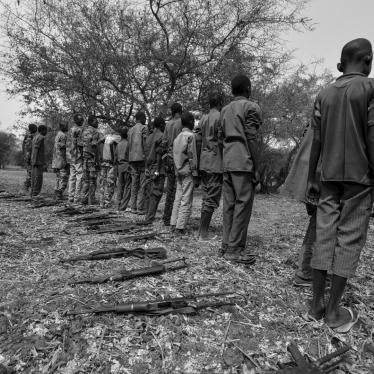Summary
This submission focuses on the provision by the United States of military assistance to governments recruiting or using children as soldiers despite restrictions on such assistance under the US Child Soldiers Prevention Act of 2008. The Child Soldiers Prevention Act prohibits several categories of US military assistance to governments that recruit or use child soldiers, or support militias or paramilitaries that use child soldiers, unless the president issues a waiver. According to the Stimson Center, a nongovernmental policy institute, since the law was enacted in 2010, the president has used his authority to grant waivers to affected countries in nearly 60 percent of all cases, and allowed 95 percent of the military assistance otherwise prohibited by the law—more than US$1.2 billion—to go through.
International Assistance and Cooperation
In its June 2013 concluding observations, the Committee on the Rights of the Child (the “Committee”) welcomed the Child Soldiers Prevention Act, but noted that presidential waivers had been granted to countries that had been found by the United Nations to recruit or use children or commit other grave violations against children. The Committee urged the United States to enact and apply full prohibition of arms exports and any kind of military assistance to governments known to recruit or use child soldiers. The Committee also encouraged the US to amend the Child Soldiers Prevention Act with a view to withdrawing the possibility of presidential waivers.[1]
In its 2016 state party report, the US said that in countries receiving full or partial waivers, much of the security assistance provided by the United States is aimed at working with their militaries to provide needed reforms. It also contended that the exercise of the waiver authority can “act as a tool in stopping recruitment of children into armed conflict,” by linking waivers to specific actions in each country.[2]
In its list of issues, the Committee asked the US to explain how the provision of military assistance has helped these countries become more compliant with the provisions of the Optional Protocol, and whether the US had assessed the effectiveness of granting waivers to stop the recruitment of children in the relevant countries.[3]
In its response, the US again stated that the waivers allowed the US to promote needed reforms and help the affected country professionalize their armed forces, providing examples from the Democratic Republic of Congo, Nigeria, and Somalia.[4]
Human Rights Watch does not find the US assertion credible. Most of the assistance provided to affected countries through waivers is completely unrelated to professionalization. One of the seven categories – International Military Education and Training (IMET) – may include some human rights training for forces, but the other six categories relate almost exclusively to the provision of arms, military equipment, and financing for military purchases.[5] Two of the categories—foreign military sales (FMS) and direct commercial sales (DCS)—refer exclusively to arms sales.
We would like to bring to the Committee’s attention the following examples:
Iraq: Iraq appeared on the US Child Soldiers Prevention Act list for the first time in 2016, and immediately received a full waiver, allowing the authorization of an estimated $150 million in foreign military financing (FMF). FMF enables recipients to purchase US defense articles, services, and training, and is used primarily to fund arms transfers.
Somalia: The US has provided full or partial waivers for Somalia for each of the last four years. Between fiscal year 2011 and fiscal year 2015, the US authorized nearly $20 million in direct commercial arms sales to Somalia. In Financial Year (FY) 2015, it authorized nearly $13 million in “Section 1206” assistance, which is used to train and equip forces for counter-terrorism operations.
South Sudan: South Sudan received a full waiver in 2012 and 2013, and partial waivers in 2014, 2015, and 2016. The assistance authorized through the waivers included over $20 million in arms sales in FY 2013.
Yemen: Until the Houthi overthrow of the Yemeni government, the US provided full waivers for Yemen for five consecutive years (2010-2014). As a result, more than $236 million in military assistance (primarily foreign military financing, excess defense articles, and counter-terrorism assistance) and more than $84 million in arms sales was authorized since FY2011.
The Stimson Center found that since the law was enacted in 2010, the US has provided more than $1.2 billion in assistance that would otherwise have been prohibited by the Child Soldiers Prevention Act, and withheld only an estimated $61 million, or approximately 5 percent of the total. It also found that of the 56 opportunities to block military assistance to governments involved in the use of child soldiers, the US gave full or partial waivers in nearly 60 percent of cases.[6]
The US states that “we try to connect specific policy actions with partial or full waivers, transforming the CSPA into a strategic diplomatic tool.” Human Rights Watch is aware of only one instance where waivers have been publicly linked to specific policy actions by an affected government. In 2012, when President Barack Obama announced a partial waiver for the Democratic Republic of Congo, the State Department issued a public statement making clear that the US would withhold foreign military financing and the training of a Congolese battalion until the Congolese government signed an action plan with the UN to end its use of child soldiers. This public linking worked: the Congolese government quickly signed the action plan, and in subsequent years, child recruitment by Congolese government forces has fallen to nearly zero.
Despite this success, this is the only case where the US government has publicly linked waivers under the Child Soldiers Prevention Act to specific actions by the recipient country. Human Rights Watch is unaware of any other instance where the US has linked waivers to specific actions by the recipient government. Together with other nongovernmental organizations, Human Rights Watch meets with the US State Department three times a year specifically to discuss implementation of the act, including the waiver determinations. Yet during these meetings, the State Department has never shared benchmarks that the US has set for governments receiving waivers. During these meetings, organizations have consistently requested that the US end the use of full waivers, and set clear benchmarks for action by affected governments.
Members of Congress publicly criticized the Obama administration for its use of waivers and introduced legislation under the current US administration that is intended to strengthen and better implement the Child Soldiers Prevention Act. For example, the Frederick Douglass Trafficking Victims Prevention and Protection Authorization Act, introduced on April 27, 2017 by a bipartisan group of Republicans and Democrats, would amend the law in the following ways:
- Require the president, if providing a presidential waiver under the Child Soldiers Prevention Act, to certify to appropriate congressional committees that the government is taking “effective and continuing steps” to address the problem of child soldiers;
- Refine the definitions under the act to clarify that government-supported police or other security forces that recruit or use child soldiers are to be covered by the Act;
- Provide a timeframe of 45 days for the Secretary of State to notify affected governments that they have been identified as subject to the Child Soldiers Prevention Act;
- Require continued annual reporting on implementation of the Child Soldiers Prevention Act beyond the first five years of its implementation, including information on the type and the monetary amount of assistance that has been withheld under the act, as well as the type and the monetary amount of assistance that has been allowed through use of waivers.
This legislation is currently pending in Congress. If adopted, these amendments could help reduce the use of waivers for countries that have done nothing to address their use of child soldiers, ensure that all government-supported entities that take an active part in hostilities during an armed conflict are considered for listing under the Child Soldiers Prevention Act, and provide for much more transparency on how the act is implemented.
Human Rights Watch recommends the Committee ask the government of the United States:
- Explain how providing a country listed under the Child Soldiers Prevention Act with arms sales or military financing “professionalizes their armed forces to be more respectful of human rights.”
- The US says that it links waivers under the Child Soldiers Prevention Act to specific actions by the recipient country. Is the US willing to make public the policy actions that have been linked to such waivers?
Human Rights Watch asks the Committee to call upon the government of the United States to:
- End the use of full national interest waivers under the Child Soldiers Prevention Act.
- In cases where the administration determines that for national security reasons it is not able to withhold all sanctionable assistance from a country that continues to recruit and use child soldiers, publicly link assistance to concrete and time-bound progress on ending the use of child soldiers. Where appropriate, use the listed country’s compliance with UN-negotiated action plans as the basis for such benchmarks.
- Report publicly each year on the type and monetary amount of military assistance that is: a) withheld from listed countries under the Child Soldier Prevention Act; and b) provided to listed countries through waivers to the act.
[1] United Nations Committee on the Rights of the Child (CRC), “Concluding observations on the second report of the United States of America submitted under article 8 of the Optional Protocol to the Convention on the involvement of children in armed conflict, adopted by the Committee at its sixty-second session (14 January–1 February 2013),” CRC/C/OPAC/USA/CO/2, June 26, 2013, http://tbinternet.ohchr.org/_layouts/treatybodyexternal/Download.aspx?symbolno=CRC/C/OPAC/USA/CO/2&Lang=En (accessed May 5, 2017), paras. 40-41.
[2] “Consideration of reports submitted by States parties under article 8 (1) of the Optional Protocol to the Convention on the Rights of the Child on the involvement of children in armed conflict Reports of States parties due in 2016, United States of America, CRC/C/OPAC/USA/3-4, September 15, 2016, http://tbinternet.ohchr.org/_layouts/treatybodyexternal/Download.aspx?symbolno=CRC%2fC%2fOPAC%2fUSA%2f3-4&Lang=en (accessed May 5, 2017), para. 31.
[3] “List of issues in relation to the report submitted by the United States of America under article 8 (1) of the Optional Protocol to the Convention on the Rights of the Child on the involvement of children in armed conflict,” CRC/C/OPAC/USA/Q/3-4, November 8, 2016, http://tbinternet.ohchr.org/_layouts/treatybodyexternal/Download.aspx?symbolno=CRC%2fC%2fOPAC%2fUSA%2f3-4&Lang=en (accessed May 5, 2017), para. 13.
[4] “List of issues in relation to the report submitted by the United States of America under article 8 (1) of the Optional Protocol to the Convention on the Rights of the Child on the involvement of children in armed conflict Addendum, Replies of the United States of America to the list of issues,” CRC/C/OPAC/USA/Q/3-4/Add.1, March 23, 2017, http://tbinternet.ohchr.org/_layouts/treatybodyexternal/Download.aspx?symbolno=CRC%2fC%2fOPAC%2fUSA%2fQ%2f3-4%2fAdd.1&Lang=en (accessed May 5, 2017) para 33.
[5] The Child Soldiers Prevention Act prohibits US military assistance from the following accounts: International Military Education and Training (IMET), Foreign Military Financing (FMF), Direct Commercial Sales (DCS), Foreign Military Sales (FMS), Excess Defense Articles (EDA), Section 1206; and Peacekeeping Operations.
[6] Rachel Stohl and Shannon Dick, “President Trump, You Can Stop the Use of Child Soldiers,” CNN.com, April 27, 2017, http://www.cnn.com/2017/04/26/opinions/trump-child-soldiers-opinion-stohl-dick/index.html (accessed May 5, 2017); see also, Stimson Center, US Military Assistance to Governments Using or Supporting the Use of Child Soldiers FY10-FY16 under the Child Soldiers Prevention Act, https://www.stimson.org/sites/default/files/FY2017%20CSPA%20Data%202.pdf (accessed May 5, 2017).







